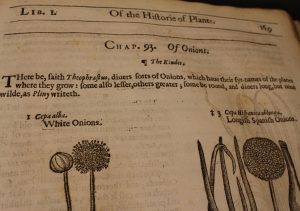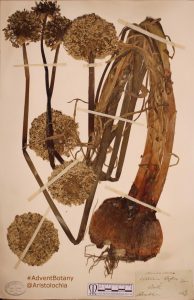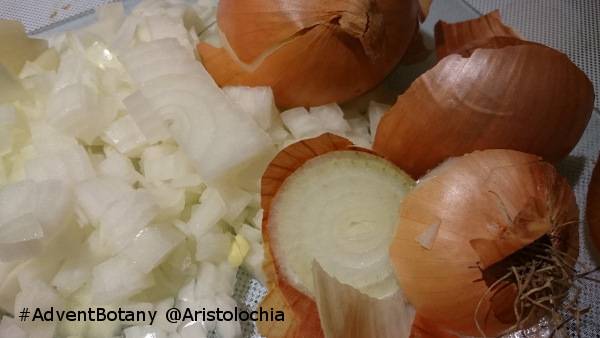By Rachel Webster

Not much of a surprise here, but after covering sage yesterday we really had to say a few words about onions today. If you want to be growing your own, then John Gerard’s Herball suggests that ‘The onion requireth a fat ground well digged and dunged.’ However, as they are prone to rots and mildews, it might be better to go with some more modern horticultural advice in this instance! Gerard also reports that ‘it is cherished everie where in kitchen gardens…’ and that certainly hasn’t changed much since the 16th century. It’s fair to say that most of my cooking starts with an onion or two, despite the fact that I only have to look at one for it to make me cry.
Chopping the onion up damages the cells and causes the release of enzymes and compounds that results in the production of the eye-irritating chemical with the catchy name syn-Propanethial S-oxide (try Scientific American for more detail). [Editor’s note: the popular chemistry blog Compound Interest also explains the chemistry of onion].

If you want to preserve your onion for posterity, it’s the sort of structure which would benefit from being kept as a spirit specimen, but we do have plenty of onion species in the herbarium collections. The Herbarium Handbook (Bridson and Foreman, 1999) recommends slicing bulbs in half before pressing them. Otherwise, the bulb will still be alive in the press and may start to sprout. In 1866, the person who prepared this herbarium sheet chose leave the outside layers of the bulb and remove all of the flesh from the inside. This will have made it possible to press it, but I only hope they did this somewhere with good ventilation!

The onion has fleshy leaf bases (scales) which surround the budding new plant, and has papery outer layers known as tunics which protect the bulb. A bulb allows a plant to store food reserves so that it can survive a period of dormancy through adverse weather (such as wet, cold winter in the UK, or hot dry Mediterranean summers). This sort of plant is called a geophyte, as the plant’s stores are often underground, where they are better protected from frost, drought or the prying eyes of herbivores. Personally, over the holidays I shall be trying my best to be dormant on the sofa with a good supply of chocolate to see me through the dark and the cold.
For more on onions and the incredible plant collections at MANCH visit Herbology Manchester.
